Why visitors don't want to leave personal data at the front desk

Can you remember the last time you visited someone’s office for a meeting and signed in at their front desk? You probably left some personal data at the front desk without even realizing it.
It's pretty standard practice for reception staff to ask you a few polite but pointed questions about your visit. You might have to present your government-issued ID or even have your picture taken for a visitor badge.
How does that whole experience make you feel?
The front desk experience matters
Even if reception staff are smiling and good-natured, chances are you might have had an uncomfortable experience along the way. Perhaps you felt nervous at some point, handing your personal details over to virtual strangers.
We get it and we've been there. Most visitors deeply value their privacy. It was pretty much confirmed in our independent poll, the Front Desk Experience Survey 2018: Nearly half of the business professionals surveyed indicated bad experiences in corporate lobbies. Furthermore, many of them had serious reservations about providing personal data during check-in.
In this post, we'll cover a handful of reasons why visitors don’t want to leave personal data at your front desk.
Top 5 reasons visitors avoid leaving personal data at the front desk
1) They feel it’s unnecessary
The number one reason why people don’t want to provide their personal data is they feel it’s unnecessary. In fact, 85% of the people surveyed indicated
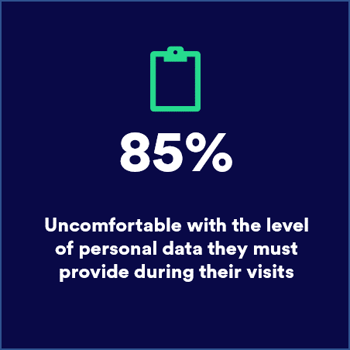 “It’s none of your business,” or “I’m just here for a meeting, why do you need my ID?” and “What is this, a military establishment?!”
“It’s none of your business,” or “I’m just here for a meeting, why do you need my ID?” and “What is this, a military establishment?!”
The last thing you want is for your visitors to lose their cool in your lobby and have the situation escalate. That's why it's always a good idea to let them know why you need to collect certain visitor data in the first place.
The good news? Using a visitor management system like Proxyclick means you can use custom screens to add any questions, messages, or images you need.
That way, you can present conditional questions so that your visitors are only providing information that's absolutely necessary. More on this here.
2) They feel strongly about data privacy
Data privacy is not just a buzzword but a pretty big deal, globally.
Data is considered to be an enormously valuable resource and over 80 countries around the world have drafted data privacy laws to protect it. You may have heard about the upcoming California Consumer Privacy Act (CCPA) and Japan's Act on the Protection of Personal Information (APPI) acts, for example. And the EU has been strictly enforcing the General Data Protection Regulation (GDPR) fines recently.
So most of your visitors are going to feel strongly about data privacy. Even if you convince them to share their basic details like asking them to jot down their names on a visitor sign-in sheet, you should prepare yourself for those who guard their personal data aggressively.
According to survey results, two-thirds of those polled admitted to peeking at the info in the paper logbook they just signed into.
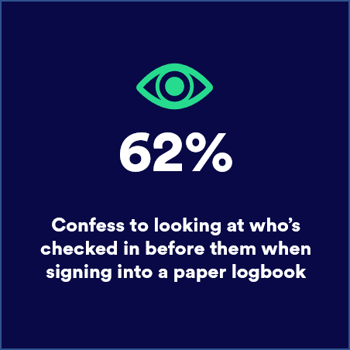 Knowing that just anyone who comes in after them can see their telephone number, email address, or any other pieces of information that most global data privacy regulations deem "personal data," shouldn't you take better measures?
Knowing that just anyone who comes in after them can see their telephone number, email address, or any other pieces of information that most global data privacy regulations deem "personal data," shouldn't you take better measures?
Using a cloud-based visitor management system like Proxyclick can help you do just that.
3) They don’t want you storing their data
Many companies store the data they gather from visitors.
Later, they make use of the data in various ways. For example, some companies send out personalized offers to guests on their email addresses or directly call them on the telephone numbers they left behind. Others may sell the gathered data to a third party for a princely sum (this is precisely what CCPA is all about).
Most of your guests are likely to have been cold-called or bombarded with emails in the past. It’s why they don’t want you storing their data. They don’t want a repeat of the experience, regardless of whether it is warranted. It doesn’t help that GDPR and other data privacy laws offer some leeway when it comes to prospecting. It's important to know the differences between GDPR and CCPA.
When it comes to the storing or deleting of data, having the option to delete your visit data manually is a must. With Proxyclick, you can even automate the process so that you remove the margin of human error (things get busy and we all forget things on our to-do lists).
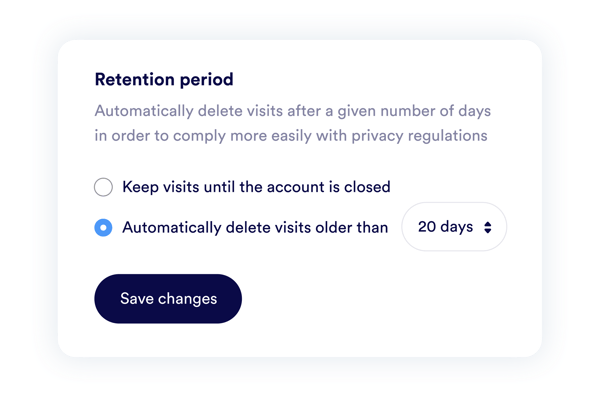 By automating the process, you get to set your data retention dates and have a process in place to show in case of an audit.
By automating the process, you get to set your data retention dates and have a process in place to show in case of an audit.
You always want to stay on the right side of regulatory compliance.
4) It makes them feel like criminals
Many modern check-in systems can be downright intrusive, but it's a necessary evil in the times we live in. Though everyone seems focused on "keeping the bad guys out," at Proxyclick we strive to transform the way people are welcomed in a safe and seamless way.
Whether it's identity verification using facial recognition, the use of global watchlists, or access control, it's possible to put strong security procedures in place without disturbing the visitor experience. More on security here.
Needless to say, guests sometimes don’t expect to be checked so thoroughly when they enter an office building for a simple meeting. Most guests are okay with basic security checks, but they don’t want to be made to feel like criminals.
That's why it's all the more important to have a system in place that's easy to use, beautiful to the eye, and takes the visitor journey into account far before then ever get to your premises.
Something as simple as an invitation email, for example, can really set your brand apart and
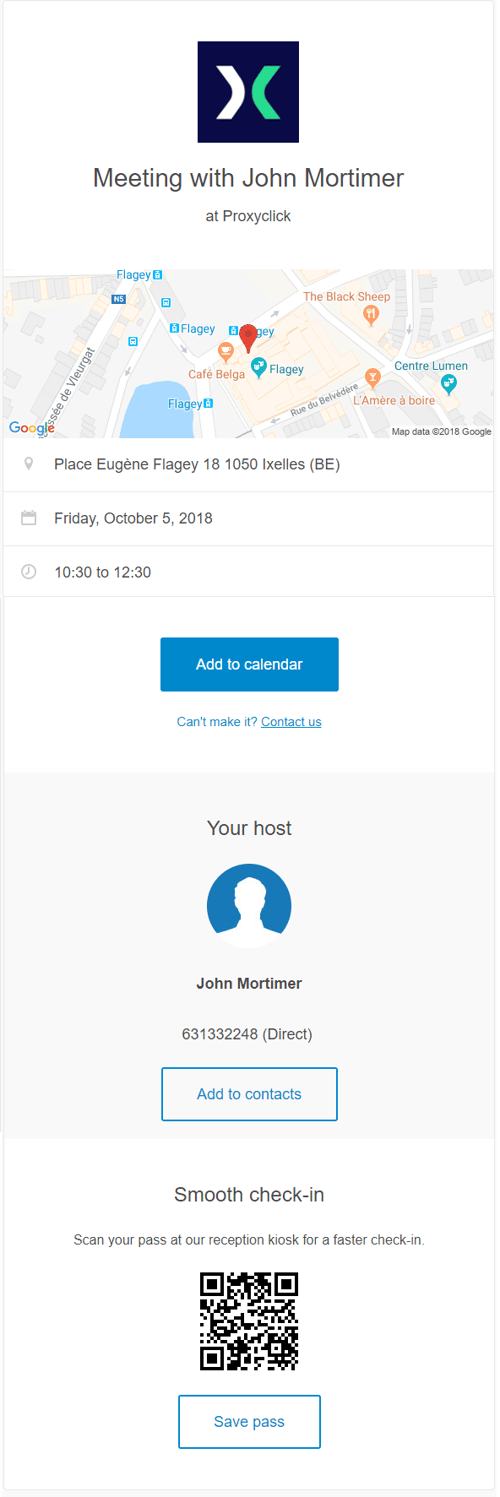
5) They don’t have time to waste
We've heard time and time again that "time is money. "
Nobody has much time to waste in this day and age. And check-in processes tend to be time-consuming. This is especially true when they're paper-based and there’s a long queue at the reception already.
In fact, 60% of the business professionals we surveyed pegged long lines at reception as the culprit in meeting starting late.
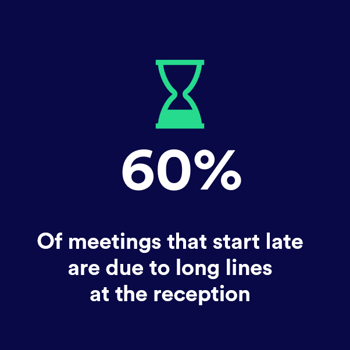 The reasons cited included many of the following you might recognize yourself:
The reasons cited included many of the following you might recognize yourself:
- queues at reception desks
- the receptionist being unable to contact the host
- too many forms to fill in, and
- reception being wholly unaware of the meeting
The last thing you want when you're running late, is to asked for loads of personal information. This is truly when you should used technology to your advantage. Going digital with your visitor management process means you can streamline your front desk and impress your visitors at the same time.
So how do you keep visitors happy but still collect their personal information?
We gave you a list of common reasons why guests don’t want to leave their personal information at the front desk. But we all know that you absolutely must have their personal information, for various business reasons. And you can’t afford to make them feel uncomfortable. So what do you do?
There are multiple solutions to the problem:
- Set up a visitor management system that protects your visitors’ privacy. If you don’t have one, get one. That way, your guests will feel secure that their data is being protected.
- Make the move from a paper-based visitor sign-in sheet to a digital one, if you haven’t already. Not only do digital sheets offer more privacy, but they are also easier to fill in.
- Collect only the bare minimum data you need. Pledge to not use the data to infringe on your guest’s privacy. More on GDPR and visitor management here.
Proxyclick offers a non-intrusive system that can safeguard your visitors’ personal data and provide you an audit trail for security and compliance. You can start your free trial right away and make your visitors feel safe and comfortable!


